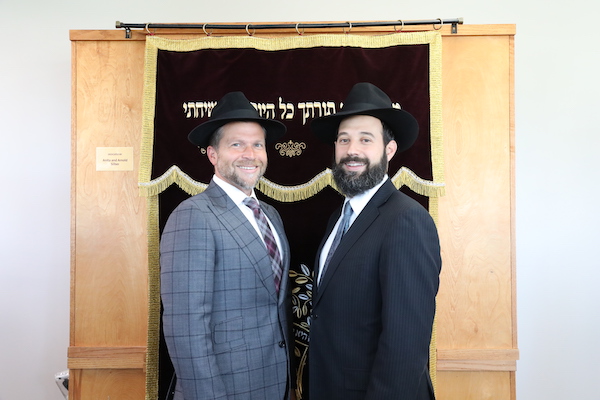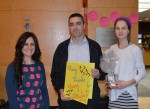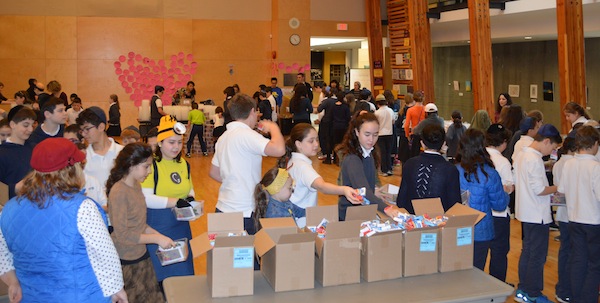Rabbis Noam Abramchik, left, and Aaron Kamin. (photo from Pacific Torah Institute)
After 16 years in Vancouver, the Pacific Torah Institute yeshivah is closing. The school, which operates out of the Lubavitch Centre at Oak and 41st Avenue, was established by Rabbi Noam Abramchik and Rabbi Dovid Davidowitz in 2003.
Over the years, the program – which offers an education based on the Chofetz Chaim Yeshivah in Queens, N.Y. – has graduated more than 100 students from the high school and more than 200 in the beis midrash program. It is currently led by Abramchik, who is originally from Chicago, and Rabbi Aaron Kamin, who joined the yeshivah from New York in 2005.
Abramchik spoke of the dwindling number of students. “The high cost of living has driven most of the shomer Shabbos community out of Vancouver to other cities,” he said, estimating that 45 Orthodox families have left Vancouver in the last three years. Schara Tzedeck’s Rabbi Andrew Rosenblatt calls it, “the frum flight,” he said.
Families from all over North America have sought out PTI for their sons, he said, “But now, the community essentially felt that we were a luxury that could no longer be afforded, since the actual number of local ‘customers’ was slim to none.”
Abramchik spoke of the yeshivah students as “the most visible sign of Orthodox life in Vancouver.” PTI’s biggest contribution to Jewish life in Vancouver, he said, was “its adherence to Torah, studied at the highest level.”
The impact on religious Jewish life will be “immeasurable,” he said. “We offer university-level Judaic studies.” Few communities offer a post-high school program, he said, so the closure of PTI will mark a dramatic change for Jewish life in Vancouver.
Michael Sachs joined the board of PTI a year ago, when a secondary board was established by local professionals, with the purpose of keeping the yeshivah in Vancouver. Sachs, who is president of the board of the Bayit shul in Richmond, began his connection to PTI in its early years, with a stint as the coach of the school’s basketball team.
Sachs said there was a need for a yeshivah in Vancouver, even if most of the students came from elsewhere. “There’s a lack of understanding in the community about the extent of the yeshivah’s contribution to local Orthodox families,” he said, adding, “PTI is not the only institution affected by the yeshivah’s closure.” Other schools – Shalhevet Girls High School and Vancouver Hebrew Academy – shared resources with PTI, he said, “which allowed them to benefit from more staff and lower expenses.”
Sachs said he is heartbroken about the closure. “This is a loss that ripples across the whole Jewish community,” he said. “Any loss to a Jewish community is a big loss. The impact will be economic, social, educational and personal. People are losing their friends to other cities.”
He said, “The students ate at Café FortyOne, at Omnitsky; the yeshivah rented space at Lubavitch Centre; these students volunteered in our community.” He described the “impossible task” of saving the yeshivah, despite the rabbis and staff having made personal sacrifices to try and keep it afloat.
July 18 will be the last day of classes for PTI students. After that, the school will be packed up and moved to Las Vegas, where it will merge with another yeshivah there. The boys will continue with their program while living in dormitories. While yeshivot have moved in the past – especially after the Second World War – the merger is a new concept.
The future is still uncertain for some PTI students, who have been interviewed for yeshivot in Toronto, Milwaukee and Denver, among other places. Some families are considering yeshivot in Israel. The PTI program is highly regarded, Abramchik explained, “cities have been vying for the boys. Fifteen cities have asked PTI students to move to them, and 10 boys are coming this week to be interviewed for the new [merged] program in Las Vegas.”
Abramchik and Kamin spoke with regret of the move.
“We feel very rooted in this community,” said Kamin. “Three of our kids were born here, we’ve made brises, bar mitzvahs here. My married kids are very emotional, they feel as though their home is being uprooted.”
Abramchik agreed. “Kids are part of the mission,” he said. “They’re invested in the yeshivah and it’s been an anchor in their childhood. It’s very painful.” However, he said, “You have to be adaptable as educators, trends are changing all the time.”
Shula Klinger is an author and journalist living in North Vancouver. Find out more at shulaklinger.com.





